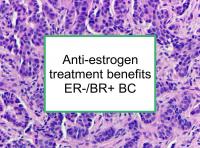A study presented at the annual American Society of Clinical Oncology Meeting has reported that breast cancer patients with ER-/PR+ tumors and treated with endocrine therapy have a survival advantage at five years over those with ER-/PR- disease. The study was designed to investigate breast cancer-specific features and survival rates according to hormone receptor status.
The significance of the PR as a predictor of response to endocrine treatment such as aromatase inhibitors in invasive breast cancer is controversial and has not been established.
The study included patients in a breast cancer database who were diagnosed with breast cancer in west Ireland between 1995 and 2005. Data regarding patient age, HER2 status, tumor grade, and stage of disease was collected. ER and PR status were determined using immunohistochemistry. Disease free survival and overall survival were determined for each patient. Both ER and PR were assessed for 851 of the 1,190 breast cancer patients: 468 (55%) were ER+/PR+, 119 (14%) were ER+/PR-, 77 (9%) were ER-/PR+ and 187 (22%) were ER-/PR-.
Patients in the ER-/PR+ group tended to be younger than patients in the other groups, with an average age of 53 years, whereas ER+/PR- patients tended to be older, with an average age of 64 years. ER- patients were more likely to have a higher grade of disease. ER+/PR+ tumors were less likely to be HER2+ than the other three ER/PR combinations. Patients in the ER-/PR+ group were found to have a distinct survival advantage at five years after diagnosis, significantly better than those with ER-/PR- disease and similar to those who with ER+/PR- disease.
The authors conclude that PR status is an independent predictor of response to endocrine therapy. This result highlights the importance of measuring PR in invasive breast cancer, as otherwise 10% of endocrine responsive patients would be denied valuable adjuvant therapy.
Please see our article on mixed hormone receptor (ER+/PR- or ER-/PR+) breast cancer prognosis for more information.
